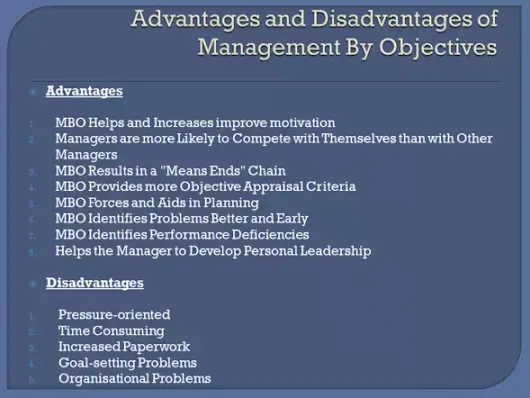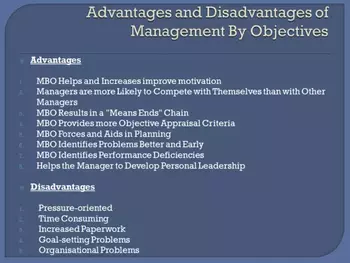Table of Contents:-
- Advantages and Disadvantages of MBO
- Advantages of MBO
- Disadvantages of MBO
Advantages and Disadvantages of MBO
The advantages of MBO also include improved communication within the organization. As employees and managers collaborate to define objectives and align them with the organization’s goals, communication channels are naturally opened. Regular discussions about challenges, progress, and strategies occur, creating a more transparent and communicative work environment. This improved communication ensures that everyone is on the same page and also fosters a sense of teamwork and shared purpose.
Management by Objectives (MBO) is a strategic management approach that offers many benefits to an organization. This method involves setting specific objectives and goals for employees, which are aligned with the overall objectives of the organization. By implementing MBO, businesses can enhance their performance, improve communication, and foster a results-oriented organisational culture.
One of the key advantages of MBO is its ability to improve organisational performance. By setting clear and measurable objectives, employees can have a better understanding of what is being expected from them. This clarity of work among workforce diversity helps to align individual efforts with the broader goals of the organization. It ensures that everyone is working towards the same objectives.
Furthermore, another advantage of MBO lies in its ability to create a results-oriented culture. When employees are actively involved in setting their objectives and understand the impact of their work on the organization’s success, they become more motivated to achieve the desired outcomes. This empowerment drives a culture of accountability and ownership, where individuals take responsibility for their contributions and outcomes. Consequently, this results-oriented culture drives continuous improvement and innovation throughout the organization.
mbo advantages and disadvantages are as follows:
Advantages of MBO
The advantages of MBO are multifaceted and impactful. These advantages improve organizational performance, enhance communication, and foster a results-oriented culture. By aligning individual and team objectives with the broader goals of the organization, MBO drives productivity, efficiency, and overall success.
The advantages of MBO are given as follows:
- MBO Helps and Increases improve motivation
- Managers are likely to Compete More with Themselves than Others
- MBO Results in a “Means Ends” Chain
- MBO Provides more Objective Appraisal Criteria
- MBO Forces and Aids in Planning
- MBO Identifies Problems Better and Early
- MBO Identifies Performance Deficiencies
- Helps the Manager to Develop Personal Leadership
1) MBO Helps and Increases improve motivation
It is so because MBO relates overall goals to individual goals, and helps to increase employees’ understanding of where the organisation is and where it is heading.
2) Managers are likely to Compete More with Themselves than Others
This kind of evaluation can reduce internal conflicts that often arise when managers compete with each other to obtain scarce resources.
3) MBO Results in a “Means Ends” Chain
Management at succeedingly lower levels in the institution establishes targets that are integrated with those at the next higher level. Thus, it can help ensure that everyone’s activity is ultimately aimed toward the organisation’s performance.
4) MBO Provides more Objective Appraisal Criteria
The targets that emerge from the MBO process provide a sound set of criteria for evaluating the performance of managers.
5) MBO Forces and Aids in Planning
By forcing top management to establish a strategy and goals for the entire organisation; and by requiring other managers to set their targets and plan how to reach them.
6) MBO Identifies Problems Better and Early
Frequent performance review sessions make this possible to identify the problems as soon as possible.
7) MBO Identifies Performance Deficiencies
It Identifies Performance Deficiencies and enables the management and the employees to set individualised self-improvement goals and thus proves effective in training and developing people.
8) Helps the Manager to Develop Personal Leadership
MBO helps the individual manager to develop personal leadership, especially the skills of listening, planning, counselling, motivating and evaluating.
Disadvantages of MBO
1) Pressure-oriented
MBO may prove to be self-defeating in the long run since it is tied to reward punishment psychology. It is a clear violation of the integrity of a subordinate’s personality. MBO programs sometimes discriminate against superior performers.
2) Time-Consuming
MBO demands a great deal of time to set objectives carefully at all levels of the organisation. Initially to instil confidence in associates in the ‘new system’ superiors may have to hold many meetings. The formal, periodic progress and final review sessions also take time.
3) Increased Paperwork
MBO programs introduce a tidal wave of newsletters, instruction booklets, training manuals, questionnaires, performance data, and reports into the organisation. To stay abreast of what is going on in the organisation managers may demand regular reports and data in writing resulting in a gruelling exercise in filling out forms.
4) Goal-setting Problems
MBO works when important measurable objectives are jointly agreed upon. It works less when; Verifiable goals are difficult to set; Goals tend to take precedence over the people who use them; Goals are inflexible and rigid; There is over-emphasis on quantifiable and easily measurable results instead of important results; Overemphasis on short-term goals at the expenses of long-term goals.
5) Organisational Problems
MBO is not soothing for all organisational ills. It is not for everybody. MBO creates more problems than it solves them, when:
i) There is a failure to teach philosophy to all participants. Too often MBO is introduced across the organisation with little explanation, help or training;
ii) There is a failure to limit objectives. Too many purposes obscure priorities and create a sense of fear and panic among subordinates;
iii) The program is used as a ‘whip’ to control employee performance;
iv) It leads to a tug-of-war in which the subordinate tries to set the lowest possible targets and superior the highest;
v) Managers turn MBO into fraud and start ‘playing games’.

